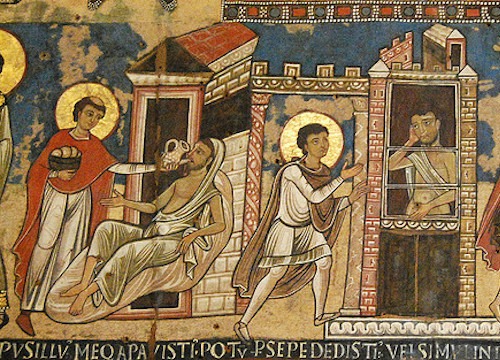We run our website the way we wished the whole internet worked: we provide high quality original content with no ads. We are funded solely by your direct support. Please consider supporting this project.

The Call to a Cruciform Life
Jesus repeatedly taught that following him meant that one had to be willing to “pick up their cross daily and follow [him]” (Lk 9:23; 14:27). Picking up our cross is the centerpiece of following Jesus because this was the centerpiece of what Jesus was all about. The thematic centrality of the cross is also illustrated in Jesus’ teaching that to be considered a “child of your Father in heaven,” one has to be willing to refuse to retaliate and instead “love your enemies and pray for those who persecute you” (Mt 5:44-5, cf., 38; Lk 6:27-35), for this is precisely the example that Jesus set when he refused to use his power to defend himself, choosing instead to die for his enemies rather than to crush them (Mt 26:51-3).
Along the same line, the cross is the thematic center of all of Jesus’ teachings that speak of the need for people to lose their life in order to find it (Mt 10:39; 16:25) and that associate greatness with humility, innocence and serving others (e.g., Mt 16:11-4; 23:11-2; Lk 18:15-7). In addition, Jesus takes the common understanding of power and turns it on its head by associating it with a willingness to sacrificially serve others (e.g., Mt 20:20-8).
The cross was not merely something God did for us; it was also an example God calls disciples to follow. It is thus significant that after defining the kind of love that characterizes God by pointing us to Jesus’ death on the cross, John immediately goes on to add: “And we ought to lay down our lives for one another“ (1 Jn 3:16, emphasis added). This and a number of similar passages make it evident that God’s will is for the cruciform love that defines his own, eternal, triune nature to transform us and flow through us to others.
In yesterday’s post, I briefly introduced Augustine’s subjective definition of love that enabled him, and multitudes of others that followed him, to claim that for God as well as God’s people, loving enemies does not necessarily rule out torturing and killing them. This definition is explicitly ruled out by the teachings of Jesus and Paul. Jesus commanded us not merely to love our enemies as an inner disposition, but to express this love by how we actually treat them. The love that Jesus teaches and models is both active and nonviolent.
We are specifically instructed to “bless,” “pray for,” “do good” to, “be merciful” toward, and to “lend to” our enemies “without expecting to get anything back” (Mt 5:44-45, Lk 6:28-29, 35). These are not inner dispositions: they are concrete behaviors! So too, we are taught to disobey the OT’s command to exact just retribution and to instead “not resist (antistemi) an evil doer” and to turn the other check when struck (Mt 5:38-9). These are obviously not merely instructions about how we should think or feel in response to enemies: they are instructions on how we are to actually behave in response to the hostile behavior of enemies!
The same holds true when Paul instructs us to “[b]less”—“not curse”—those who persecute us (Rom 12:14), and to never “repay evil for evil” (Rom 12:17). Specific behaviors are also implied when Paul instructs us to never “exact revenge” (12:19), but to instead “overcome evil with good” (12:21) by feeding enemies when they’re hungry and offering them something to drink when they are thirsty, for example (Rom 12:20). All of these passages expose the artificiality of Augustine’s fateful attempt to divorce the love we are commanded to live in from the commitment to non-violence that is entailed by this love.
There is not one exception clause to any of the NT’s instructions about loving enemies and, therefore, the refusal to resort to violence in response to them. To the contrary, the unqualified way Jesus speaks about enemies makes it clear that it includes every possible enemy who is threatening us for any possible reason. Moreover, far from allowing for “justified” exceptions, Jesus explicitly rules out any possible exceptions when he emphasized in as strong as terms as possible that his followers were to love indiscriminately—the way God loves and blesses the just and unjust by causing his sun to shine and his rain to fall on everyone, without any regard to whether the people we are called to love deserve it or not (Mt 5:45; Lk 6:35). The sun and rain do not pick and choose whom they will and will not fall on. Rather, the sun shines and the rain falls simply because it’s the sun’s nature to shine and it’s the nature of rain to fall.
Category: General
Tags: Cruciform Theology, Enemy Love, Kingdom Living
Topics: Following Jesus
Related Reading

Blessing the Soldiers of ISIS
In light of the overwhelming response to Greg’s post about loving the soldiers of ISIS, we thought we would explore Jesus’ teaching on this topic further. The following is an excerpt from Myth of a Christian Religion. The perspective below stands in contrast to the perspectives exhibited by many Christians, one being the recent article…

A Dialogue with Derek Flood Part 2: Is ALL of the Bible Inspired?
Image by TheRevSteve via Flickr Yesterday, I offered the first part of my response to Flood’s comments regarding my review of his book. Today I’ll finish up my thoughts. Scripture and Its Interpretation Flood confesses that he is confused as to how I can claim that “in the light of Christ, we must reject violent interpretations of Scripture”…

Life to the Full
What does it mean to live life to the full? Greg addresses this question in this short video by The Work of the People.

The Problem with Christocentrism
As we’ve discussed in the previous posts, there has been a growing move toward a Christocentric orientation in theology since Barth, and especially over the last fifty years. I enthusiastically applaud this trend, for I’m persuaded it reflects the orientation of the NT itself, so far as it goes. The trouble is, it seems to…

The Old Testament Is NOT on the Same Plane as the New Testament
Paul taught that unbelievers are blinded by “the god of this age” when they read the OT such that “their minds are made dull” and a “veil covers their hearts…when the old covenant is read” (2 Cor. 4:4; 3:14-15). This is why they are unable to see “the light of the knowledge of God’s glory…

Divine Accommodation in the Early Church
One of the basic points made in The Crucifixion of the Warrior God is that the Old Testament reveals how God adjusts his revelation and instructions to accommodate the weakness of his covenant people. This is actually not a new observation as is reflected in a variety of ways throughout Church history. For example, in…
